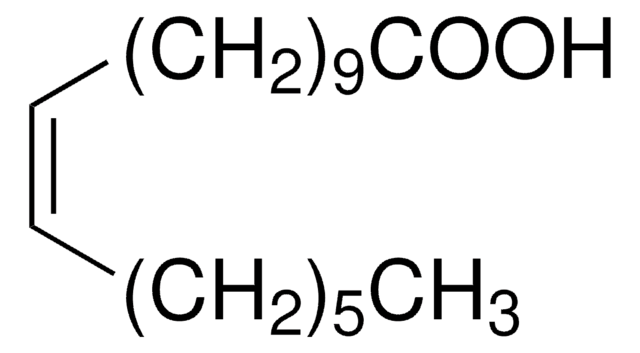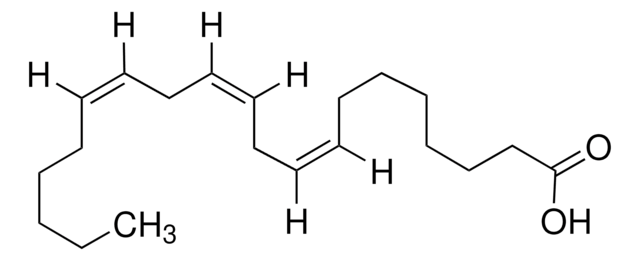P9417
Palmitoleic acid
≥98.5% (GC), liquid
Synonym(s):
cis-9-Palmitoleic acid, cis-9-Hexadecenoic acid
About This Item
Recommended Products
biological source
Macadamia integrifolia
Quality Level
Assay
≥98.5% (GC)
form
liquid
refractive index
n20/D 1.457 (lit.)
bp
162 °C/0.6 mmHg (lit.)
mp
0.5 °C (lit.)
density
0.895 g/mL at 20 °C (lit.)
functional group
carboxylic acid
oleic acid
lipid type
unsaturated FAs
shipped in
ambient
storage temp.
−20°C
SMILES string
CCCCCC\C=C/CCCCCCCC(O)=O
InChI
1S/C16H30O2/c1-2-3-4-5-6-7-8-9-10-11-12-13-14-15-16(17)18/h7-8H,2-6,9-15H2,1H3,(H,17,18)/b8-7-
InChI key
SECPZKHBENQXJG-FPLPWBNLSA-N
Looking for similar products? Visit Product Comparison Guide
Application
- to supplement Minimum Essential Media alpha (MEMα) to culture mouse spermatogonial stem cells (SSCs)
- as a component of a defined serum-free medium for the long-term propagation of SSCs
- in Dulbecco′s Modified Eagle Medium (DMEM) in the media for fatty acid treatment to assure a physiologic ratio between bound and unbound free fatty acid (FFA)
Biochem/physiol Actions
Signal Word
Warning
Hazard Statements
Precautionary Statements
Hazard Classifications
Aquatic Chronic 4 - Eye Irrit. 2 - Skin Irrit. 2 - STOT SE 3
Target Organs
Respiratory system
Storage Class Code
10 - Combustible liquids
WGK
WGK 1
Flash Point(F)
143.6 °F - closed cup
Flash Point(C)
62 °C - closed cup
Personal Protective Equipment
Choose from one of the most recent versions:
Already Own This Product?
Find documentation for the products that you have recently purchased in the Document Library.
Customers Also Viewed
Articles
Lipid Induced Insulin Resistance
Our team of scientists has experience in all areas of research including Life Science, Material Science, Chemical Synthesis, Chromatography, Analytical and many others.
Contact Technical Service












